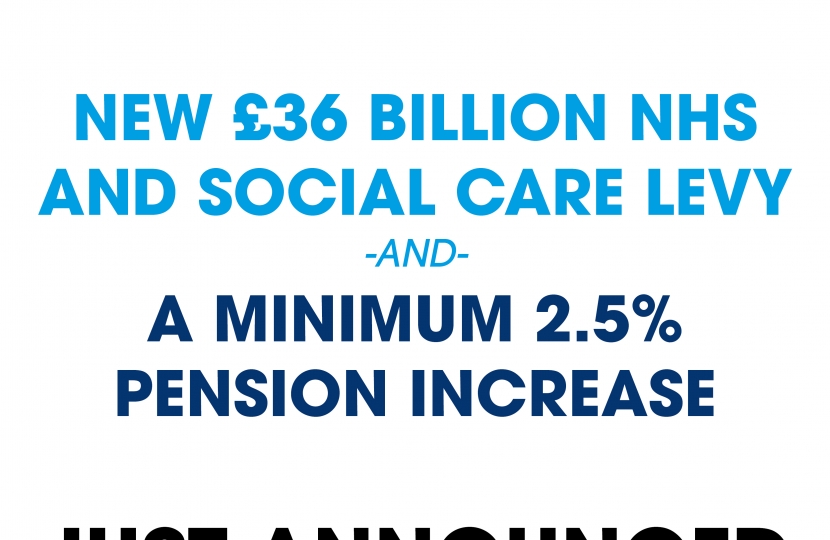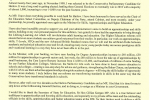
Statement on NHS and Social Care Levy and Pensions
The Prime Minister has announced an additional £36 billion for the NHS and social care.
Over the past eighteen months, this country has faced a national emergency of which nothing is comparable since World War Two. In order to save the NHS and protect people’s jobs and livelihoods, the Government has spent £407 billion worth of taxpayers’ money. In Harlow, well over £170 million was spent and 16,000 jobs were saved through the furlough scheme.
As a result of Covid-19, our country now has a national debt of over £2.5 trillion. This is money that will have to be paid back. For this reason, the Government has had to make some very difficult decisions.
These are not decisions taken to win easy popularity and quick votes but to ensure lasting economic and health security for our country. No Government, no political party and no manifesto could ever have predicted that we would enter a worldwide pandemic.
I care passionately about the NHS. I was born with cerebral palsy and, were it not for Great Ormond Street Children’s Hospital, I would not be walking today. That is why I welcome the extra £36 billion for the NHS.
The coronavirus pandemic has led to a huge backlog in appointments, with the risk of 13 million patients being left stranded on NHS waiting lists. As my email inbox shows, a great number of residents from Harlow and the Villages are waiting for GP surgery appointments, missed operations and treatments.
Further to this, our social care system is not fit for purpose. The system does not adequately support those on low incomes or those who will have to sell their home to get the right care they need. Currently, over one in seven people end up spending more than £100,000 on their social care. This is not sustainable.
To deal with these problems and ensure that we fund the NHS properly, the Prime Minister has today announced the new NHS and Social Care Levy. This levy will raise an extra £36 billion for the NHS and social care over the next three years, on top of the extra £34 billion promised in the 2019 election for the NHS.
The money will be ring-fenced and guaranteed for the NHS frontline. These funds will help clear the NHS backlog and support patient care.
Some of this investment will go towards our new hospital in Harlow, which will cost many hundreds of millions of pounds.
As well as supporting the NHS, this money will mean that residents from low incomes will be able to be given proper social care in their old age. The levy will be used to upskill the social care workforce, strengthen the adult social care system and cap adult social care costs.
In the House of Commons, I urged the Prime Minister to support those on lower incomes. I asked what mitigating factors can be put in place to lift the burden of the new NHS levy. The Prime Minister confirmed that those who are earning less than £9,500 per year will not contribute. He also noted that the Government will be lifting the minimum assets for which people can be liable from £14,000 to £20,000.
However, the crucial point is that the NHS Social Care Levy will be predominantly on the rich rather than on those on low incomes. Those earning more will be paying more. The wealthiest 14% will pay more than 50% of this levy. Moreover, many small businesses will be protected.
The Prime Minister has stressed that 70 percent of the money raised from businesses will come from the largest one percent of businesses, while 40 percent of all businesses will pay nothing extra. To ensure that everyone pays their fair share, financial dividend tax rates will be increased by 1.25 percent. The respected and independent Institute for Fiscal Studies has described this policy as both “progressive” and “broad-based”.
It is worth noting that the lower paid are also being protected through other measures such as the increase in the national living wage to £8.91, cuts to the National Insurance threshold, the raising of the tax threshold for lower earners and the ten-year fuel duty freeze, which has saved the average worker £10 every time they fill up. A lower earner paying the basic rate of tax, now pays £1,200 less per year than they would have done otherwise.
Pensions
The Government has also confirmed that the state pension will increase by at least 2.5 percent next year.
As described above, the precarious financial situation faced by our country has forced tough decisions upon the Government. These are extraordinary times. The triple lock guarantee introduced in 2011, has led to the state pension increasing by an average of 3 per cent annually. Since 2011, the basic state pension has increased by 35 percent or £2,050. It is now worth £137.60 per week, relative to earnings, the highest it has been in 34 years. The Government is taking the decision to temporarily move to a double lock this year. This means the state pension will rise next year by the higher of inflation or 2.5 percent. This will ensure pensioners are protected against the rising cost of living. The triple lock is being removed for the time being because it would increase pensions by 8% meaning an extra £746.20 would need to be given per pensioner each year costing taxpayers many billions of pounds. There is a commitment to return to the triple lock after one year.
In conclusion
These are very hard policy decisions but it is better to do the right thing and protect our NHS, safeguard the livelihoods of those who are less well-off and get our economy back on track. If we sort these problems out now, we will be able to not just protect the NHS, and spend more on education, skills and the police but also cut the cost of taxes and living for hard-working residents in the future.
